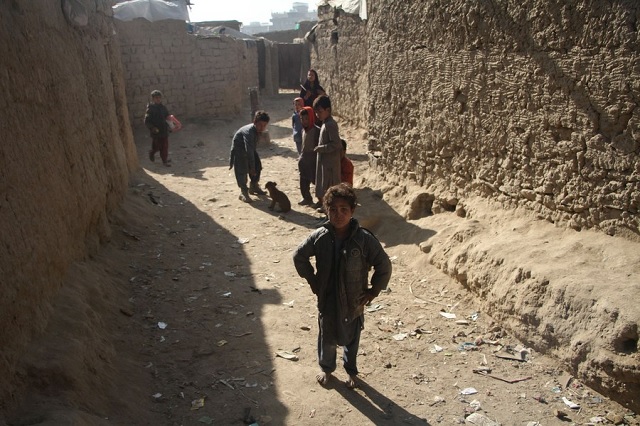
Kabul, Afghanistan | Xinhua | The United States portrays itself as a model of democracy for the rest of the world, but its so-called “beacon of democracy” has long collapsed.
Multiple countries that have been imposed the U.S. style of democracy have witnessed prolonged conflicts and insecurity, tattered national economy and massive sufferings among their people.
The U.S. democracy failed to fit in Afghanistan as well, leading to the loss of more than 100,000 Afghan lives and an unfolding humanitarian crisis.
As the weakest and most vulnerable group, Afghan children have become victims to the export of the U.S. democracy.
CHILDREN ARE DEPRIVED OF EDUCATION
Padshah, 12, can’t go to school due to extreme poverty and has to work on streets to help his family make ends meet.
The boy, who is from the northern Baghlan province, migrated along with his family to Kabul three months ago in search of better living conditions. He said that he can hardly earn 80 afghani (1 U.S. dollar equals to 96 afghani) to support his impoverished family.
Declining to reveal the number of his family members, the working boy said that from dawn to dusk he weaves through Kabul streets to earn a livelihood, as the sanctions imposed by the United States have destroyed businesses elsewhere in the country.
“People on the streets say that America has blocked Afghan assets and the brutal action has led to poverty, and that is why many people including my father have lost their jobs,” Padshah said.
He added that he was a good student at school when his father had a job and a regular income.
Following the U.S. military pullout in Afghanistan and the Taliban’s takeover of the country in mid-August, Washington reportedly has frozen more than 9 billion U.S. dollars of Afghanistan’s central bank, leaving the new rulers in the doldrums.
The sanctions have undermined bank activities in Afghanistan, as many Afghans withdrew their deposits. To avoid bankruptcy, the banks imposed restrictions under which the customers can withdraw a limited amount of money.
To survive, the Afghans, including Kabul residents, resorted to selling home appliances on roadsides, but customers are rare, as the U.S. sanctions have shrunk the purchasing power of Afghans.
The impact of Washington’s sanctions on Afghanistan is palpable as the Afghan national currency the afghani is tumbling against the U.S. dollar each day, and the rising prices of basic items forced many Afghans to find extra jobs.
An Afghan wood seller and father of five, Mir Ahmad said that poverty has forced him to disrupt his son’s schooling and bring his son to his shop as a helper.
Lamenting the chaotic situation and poverty, the distressed Ahmad said, “If I allow my son to go to school, then I have to pay a laborer at least 500 afghani daily to help me in the shop,” which is unbearable to him at this critical stage.
Denouncing the U.S. for freezing Afghan assets, Ahmad said angrily, “Blocking Afghan assets is a kind of bullying that has squeezed ordinary people like me to stop my son from going to school.”
Blaming the United States’ double standard policy for the suffering of Afghans, Ahmad said that many of his son’s classmates have also given up on school due to poverty and are working with their parents or on the streets as child labor to earn a livelihood and support their families.
CHILDREN SUFFER FROM MALNUTRITION
An Afghan mother of eight, Nafisa, who lives in Kabul, was sad that she can’t give her children enough food to eat.
“Destructive war, displacement and poverty have devoured my life and that is why my 18-month-old daughter is suffering from malnutrition here in the hospital,” she said.
“The war claimed the life of my husband one year ago and left me with eight children in poverty,” said the mother in a hospital in Kabul.
Lying on the hospital bed, the 18-month-old Karima is in a ward shared with some 10 other children who are under medical treatment.
“I have no money to buy enough food, biscuits and powder milk for my children,” said Zakia, a mother of six, who sat next to the bed of her ailing two-year-old daughter, also suffering from malnutrition.
Doctors said more Afghan children have been suffering from malnutrition this year.
“In this season in the past years we had five to seven children suffering from malnutrition but unfortunately this year nowadays we register seven such children on average every day,” Noorul Haq Yousufzai, the head of the Indira Gandhi Institute of Child Health in Kabul, told Xinhua recently.
More than half the population of Afghanistan, a record 22.8 million people, would face acute food insecurity from November, and 3.2 million children under five are expected to suffer from acute malnutrition by the end of the year, said a report by World Food Program released in October.
The Taliban-led administration has urged Washington to unfreeze the Afghan assets and not to link humanitarian issues to politics.
*****
Xinhua
 The Independent Uganda: You get the Truth we Pay the Price
The Independent Uganda: You get the Truth we Pay the Price



